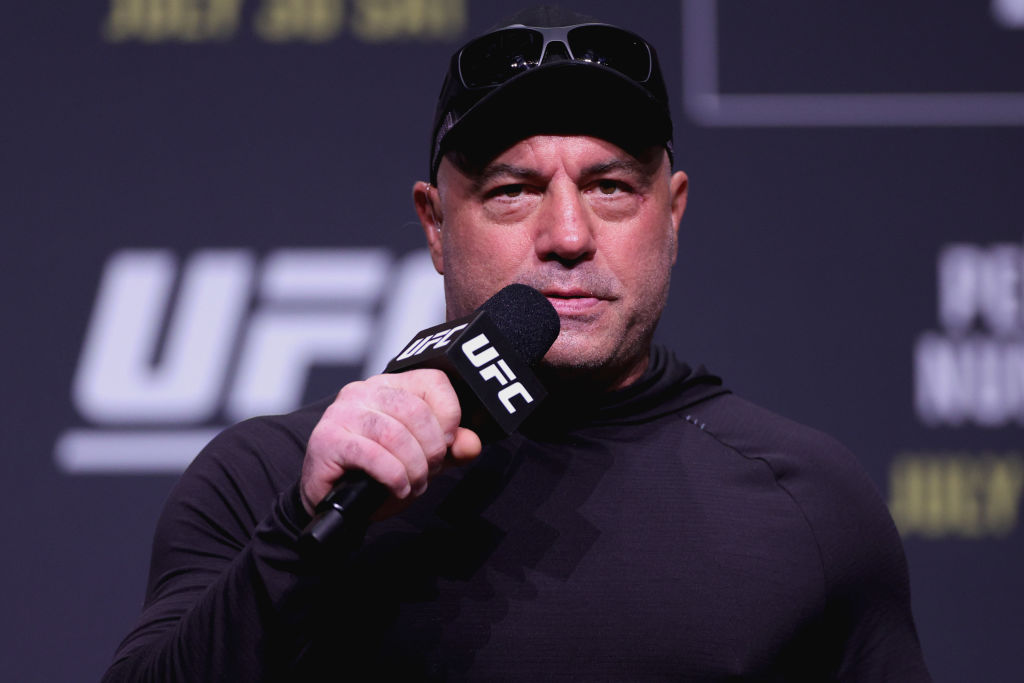One of the new cliches of American politics is that progressives need their own Joe Rogan. The comedian turned podcaster has an audience that is four-fifths male and 51 per cent aged 18-34, and it has not escaped the Democrats’ notice that, while women aged 18 to 29 voted overwhelmingly for Kamala Harris, men in the same age group went narrowly for Donald Trump. This tracks with pre-election research which showed a majority of Rogan listeners, regardless of sex or age, planned to vote Republican while only a quarter intended to back the Democrats. Rogan himself endorsed Trump, crediting Elon Musk for making ‘the most compelling case for Trump you’ll hear’. Since Rogan is America’s most popular podcaster, with 14.5 million followers on Spotify, surely it makes sense that Democrats would want their own Pied Piper to the himbos and gymbros of Gen-Z.
Democrats need a different message and a different medium
Well, his name was Joe Rogan. Rogan is a supporter of abortion rights, socialised healthcare, gay and lesbian rights, and drug legalisation, a critic of Israel’s war in Gaza, and endorsed Bernie Sanders in the 2020 Democrat primaries. But he is also a believer in freedom of expression, which has led him to interview the likes of Alex Jones and Stefan Molyneux, a disbeliever in gender identity ideology, and he discouraged young people from taking the Covid shot while talking up his self-prescribed use of anti-parasitic drug ivermectin. These heresies caused progressive activists in politics, journalism, academia and civil society to mount a campaign to get Rogan fired by Spotify. Oddly enough, Rogan didn’t take well to this attempt to destroy him professionally and financially and while it’s difficult to prove that this nudged him Trumpwards, it’s hardly a leap to guess that it probably helped.
In some ways, progressive handwringing over Rogan is just a 2020s re-run of liberal handwringing over talk radio in the 1990s. Until the 1994 ‘Republican revolution’, which ended four decades of Democrat control of the House of Representatives, liberals dismissed talk radio as a forum for obnoxious shock jocks, low-information listeners and bored truckers. Then Rush Limbaugh and his 20 million weekly listeners were identified as the culprits behind the Democrats’ congressional defeat, and talk radio became a liberal bogeyman, a production line of ‘angry white men’. There were even attempts to blame its ‘rhetoric’ for the Oklahoma City bombing. When liberals couldn’t beat conservative-dominated AM radio, they tried to mimic it and many a Democrat was hailed in newspaper puff pieces as the next ‘Limbaugh of the left’, among them Al Franken, Jim Hightower, Mario Cuomo and Bill Press. But none could compete with Limbaugh, and even liberal talk’s breakout star, Rachel Maddow, only did so by switching to television.
The problem was one identified by Marshall McLuhan three decades earlier. As a medium, AM radio was ill-suited to a liberal message shaped by elite preoccupations with minority rights, political correctness, social justice, and scepticism towards American global leadership. Liberals were trying to use a format for Archie Bunker to sell the politics of Maude Findlay. They had misunderstood Limbaugh’s talent, which was not for converting his overwhelmingly white, male audience into conservatives but for drawing out the innate conservatism of this audience. Today’s progressives misunderstand Rogan in much the same way: he’s not making young men anti-woke, sceptical of experts and fixated on physical fitness – young men are, broadly speaking, anti-woke, sceptical of experts and fixated on physical fitness.
Another flaw in the ‘progressive Joe Rogan’ proposal is that part of Rogan’s appeal – his authenticity – is that he’s not a political tribalist whose beliefs change with every shift in party strategy or ideological doctrine. Limbaugh often jabbed the Republican establishment from the right, but he was mostly a reliable party man, especially come election time. Rogan is a goofy Gen-X stoner dude with a degree from the University of Wikipedia and a policy interest in telling anyone who’ll listen how awesome it is tripping balls on DMT. Good luck trying to create a DNC version of that. Instead of astroturfing a progressive masculine culture, Democrats should ask themselves what has gone so wrong on the left that such a thing is required.
They should also ask themselves whether the fusion of politics and media is still beneficial to the American centre-left. In previous election cycles, having a sizeable segment of the news media unable or unwilling to distinguish between journalism and political activism might have served a purpose. (As Mitt Romney once quipped of the news media: ‘My job is to lay out a positive vision for the future of the country, and their job is to make sure no one else finds out about it.’) But the more progressive the Democrat party and the media have become, the further they have pushed each other from the American mainstream, whether on the economy, crime, immigration, identity politics or foreign policy. The media-political complex has become a purity spiral within a purity spiral. Progressive media radicalises an already hyper-progressive audience, with lurid tales of impending fascism. This makes it harder for progressive politicians to pursue moderation, because moderation in the struggle against fascism is tantamount to appeasement. As a result, progressive politics becomes so immoderate that it loses a presidential election to an eminently beatable opponent. Progressive media then polices the response to this defeat so that progressivism cannot be blamed and pragmatic reform cannot be pursued. Losing purely becomes a virtue and winning through compromise a vice.
The right savours those compilation videos of progressives weeping on cable news or shrieking in their cars because Trump won, but behind the schadenfreude lies a symptom of major political and psychological dysfunction. The progressive purity spiral has not only made it more difficult for Democrats to win elections, it has made it harder for them to process defeat. People hyperventilating to camera about the end of democracy are collateral damage of a style of news that treats catastrophising as a content strategy. Even after the Democrats’ defeat, MSNBC hosted a Yale psychiatry fellow who told viewers it was ‘completely fine’ to distance themselves from relatives who voted the wrong way. Helping Donald Trump win a second term is regrettable, but the damage done to Americans’ mental health is unforgivable.
The Democrats don’t need their own Joe Rogan. They need a different message and a different medium. The current message is driving voters into the arms of Donald Trump while the current medium is driving Democrats themselves into cascades of despair.








Comments